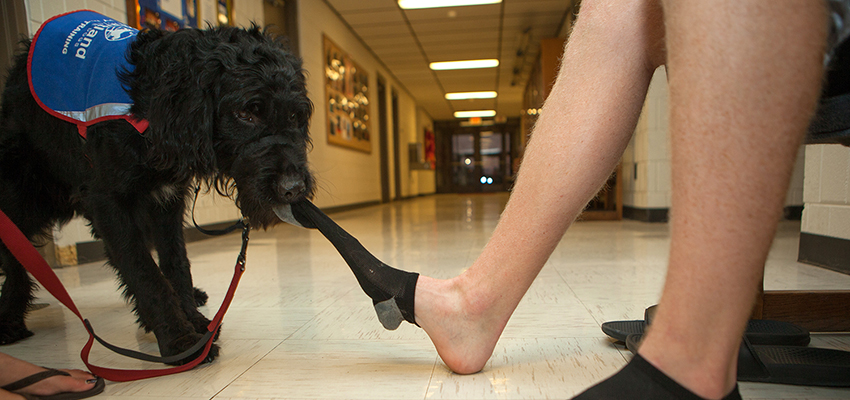The quiet, studious atmosphere of papers shuffling and keyboards tapping in Milner Library is no place for a dog, right?
Not so fast, say sophomore pre-vet majors Hannah O’Flynn and Marie Koch. They bring Abe, the service dog they are training for their new student organization, to Milner all the time.
Koch and O’Flynn created the Illinois State University Service Dog Organization (ISU SDO) this year after attending a vet school open house. They saw a presentation about a service dog organization, and they were inspired to start a similar group at Illinois State. The two then reached out to Heartland Service Dogs, located in Mokena, as an organization to provide ISU SDO with puppies to train and then find recipients once the dogs are fully trained.
“Service dogs in training have all of the rights as fully trained service dogs in Illinois, so they can be anywhere,” Koch said. “We’ve been working closely with the University and Disability Concerns.”
Koch is currently the puppy raiser for Abe, the 10-month-old golden retriever/labradoodle mix, and as such, brings him everywhere. When she is unable to care for Abe for a certain amount of time, O’Flynn can take over as a puppy sitter.
Koch and O’Flynn would not have been able to create ISU SDO without faculty advisers Kim Rhykerd and Valeri Farmer-Dougan. Rhykerd, a lecturer in the Department of Agriculture, holds her doctorate of veterinary medicine, and Koch and O’Flynn knew that would be extremely helpful in training. Farmer-Dougan is an associate professor in the Department of Psychology who works with training the dogs in some of her behavioral psychology classes.
“We start with the basics,” O’Flynn said. “Right now, Abe is learning how to turn on light switches and how to take socks on and off. He is learning handicap plates (on doors) by jumping up to hit the plate causing the door to open. Upon completion of our part of the training process, each dog will know about 30 to 40 commands.”
The training sessions at ISU SDO’s meetings offer students some valuable tips for training pets. The students practice conditioning techniques under Farmer-Dougan. Clickers are used to reinforce the dog for completing the task successfully.
“Our dogs are trained for mobility,” Koch explained.
Although there are about 40 members so far, O’Flynn expects the number to drop once students realize the time commitment involved. But there are other benefits to spending time with man’s best friend.
“Even just learning the basics of dog training is good … And it is a great way to learn about responsibility,” she said.
Added Rhykerd: “Vet school does not teach pet behavior necessarily, and we have very little canine behavior in our curriculum. This is a good way to learn what’s normal when training and how to fix any problems.”
Tough transition
Koch and O’Flynn agree that giving their dogs back to Heartland Service Dogs will be a tough transition.
“When Abe’s vest is off, he’s a normal dog. We play with him, and we cuddle with him. He’s our pet for one to two years,” O’Flynn said. “What will make it worth it is someone who needs him is going to be getting him.”
“You’ll be giving that person back their freedom,” Rhykerd agreed, going on to say that the dogs receive more personalized training once they are matched with a recipient.
The student group will have one dog permanently, so that could also help ease the difficulty of dogs coming and going. Indy, Abe’s half-sister, is a potential breeding dog in the Heartland program. She is the Rhykerd family dog and is going through the same training as Abe. If she does well, she will enter Heartland breeding program. If not, she will remain with the Rhykerds and will serve as an ambassador for the ISU SDO.
Recently, Wishbone Canine Rescue donated Hewie, a 12-week-old German shepherd/Labrador retriever mix, who had previously been a foster dog for the Farmer-Dougan family. After potty training, he will also attend the training classes with Abe and Indy.
“It’s much more than opening doors. It’s amazing what they can pick up on,” Rhykerd said.
Grace Johnson can be reached at gvjohns@IllinoisState.edu.



